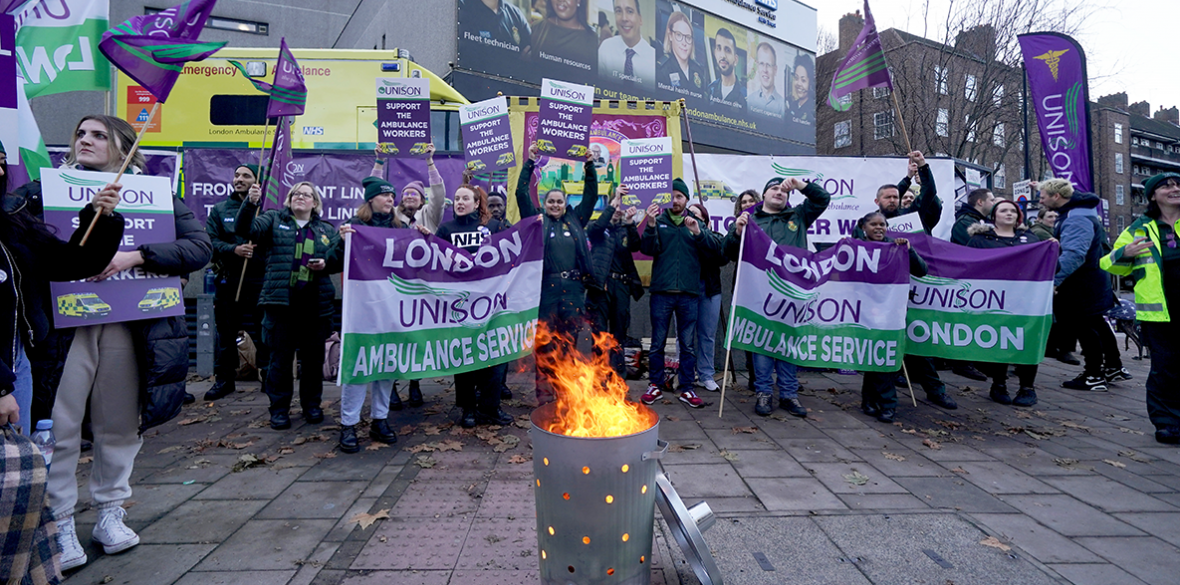STRIKE MAP, one of the most effective solidarity initiatives the labour movement has produced in recent years, can congratulate itself on provoking the fury of the Daily Mail.
Lord Rothermere’s red-baiting rag has always been at the forefront of demonising trade unions — and it is now spooked by the spectre of working-class solidarity.
Tory MPs’ specific grumbles about Strike Map’s “visit a picket” loyalty card scheme are worth noting. South Thanet MP Craig Mackinlay fears that “if activists want to join picket lines unrelated to their own industries, this is evidence emerging of ‘flying pickets’ in all but name.”
Thatcher’s anti-trade union laws were always a bid to isolate disputes.
There can be no justification whatever for stopping workers from showing support for other workers on strike by attending their picket lines, just as it is an anti-democratic affront that workers are barred from secondary picketing (picketing workplaces not yet in dispute to encourage their workforces to join the action) and indeed secondary action (striking in solidarity with other workers).
But democracy in the workplace is not part of capitalist conceptions of the term. Strikes, if they must be tolerated at all (and threatened legislation shows they increasingly won’t be), need to be carefully boxed in: disputes must be confined to a narrow range of permissible industrial questions.
It is the scale of current strike action across sectors — with heavily overlapping grievances around years of real-terms pay cuts, attacks on terms and conditions and services at breaking point — which leads Tories to fear these strikes may go beyond those.
That’s what alarms Ashford MP Damian Green, for whom the Strike Map loyalty card is “a further sign that for some unions these are political strikes.”
Of course they are. Nobody is taken in by the pretence that NHS pay is set by an “independent pay review body” or that ministers are not responsible for the intractable rail dispute.
And it’s increasingly obvious that the solutions require political change. Attempts to hold down public-sector pay are not, as Rishi Sunak claims, about fighting inflation, which is currently driven by supply rather than demand and exacerbated by the price-gouging producing swollen profit margins for big business.
They are a bid to drive down living standards to shore up the rate of profit. The second austerity wave is the whole strategy of Sunak and Jeremy Hunt’s administration.
It will, like the first, leave most British people poorer and our public services weaker — when the evidence is all around us that they are already too under-resourced to provide the “minimum service levels” ministers threaten unions with.
Victory in the strikes hitting the NHS, Civil Service, transport, the post and other areas means defeating the government. So yes, the strikes are political.
Strike Map is to be commended on a scheme that actively promotes solidarity with and between workers in struggle. Support for striking workers on picket lines in 2022 has exceeded unions’ highest hopes. The public is with the strike wave.
For the likes of the Mail, that’s dangerous.
There are uncanny echoes of the way wall-to-wall anti-Labour propaganda could not prevent the biggest leap in the Labour vote for 70 years under Jeremy Corbyn in 2017, aptly summed up by that summer’s meme of media tycoon Rupert Murdoch phoning a helpline to complain: “Hi, I bought a country and it doesn’t seem to be working properly.”
For all the different circumstances, the left’s forward march in 2017 was down to ordinary people mobilising and communicating political ideas to each other directly: it helped counter the anti-democratic influence of the newspaper barons.
As more and more people turn up to show support on picket lines, that chance to change the political narrative independently of the wishes of the elite is back.
Well done to Strike Map. No wonder the Tories are scared.









